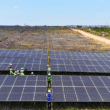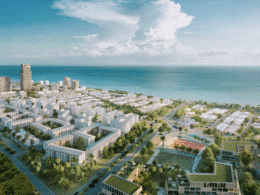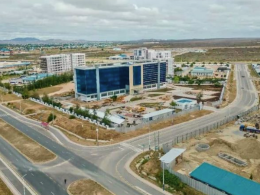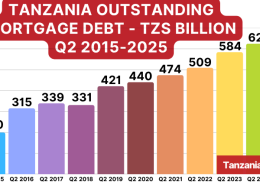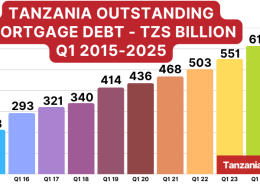TANZANIAINVEST has interviewed Architect Makumba T. Kimweri, Chief Executive of Tanzania Buildings Agency (TBA), for more insights into the agency’s mission and opportunities available for foreign investors in the Tanzania housing construction sector.
TI: What are the main objectives and activities of the Tanzania Buildings Agency and why was it established?
Makumba T. Kimweri -Tanzania Buildings Agency: The Tanzania Buildings Agency is a government agency dealing with housing for public servants.
Initially, our agency was called the Department of Buildings under the Ministry of Works, but because the department could function on its own, the government set up an act of parliament called act number 30/1997, by which the Department of Buildings was transformed into an agency in 2002.
Our aim at TBA is to house the public – civil and public servants.
The government has enabled us to build capital by giving us about 6,000 units of houses to sell. Up to now, we have sold about 7,000 units.
The extra thousand units were provided by other parastatals that joined in to sell out their houses.
Our operations are that of a realtor: we build houses, we sell houses and the money from that will be used to build more houses.
In 2004, we built small units of 153 houses and sold them.
The following year, we built 300 houses and sold them.
In 2006, we built houses in every region.
The agency is capable of building only about 250 houses every year, but our customers, who are the public servants, are about 350,000 in total.
As you can see the gap is very big.
TI: What is the agency doing to narrow this gap?
MK: There’s a lack of capital for development.
We thought of taking out a loan from the banks, but the interest rates are too high.
There is also a restriction for government agencies to obtain loans; we have to go through the Ministry of Finance for permission to borrow.
But the main problem is the interest rates are too high.
We started to take out a bank loan but the interest shot up to 17%, which is too high.
Now we’ve devised another system by sharing the development of housing through joint-ventures with parastatals or private investors interested in joining hands with us.
We started last year.
We chose plots that are very strategic in the city for development; only the government has this central area where commercial buildings can be built so we have the advantage of having these plots within the city.
Instead of only selling to the public, we partner with commercial enterprises, whereby we get a share of the plot and they put up the building of their choice.{xtypo_quote_right}Instead of only selling to the public, we partner with commercial enterprises, whereby we get a share of the plot and they put up the building of their choice.{/xtypo_quote_right}
The money we make from our share of private developments, we use to build houses for the public sector.
We have started this system in three places.
We have advertised the scheme and many people are interested to join us.
Hopefully, in two years time, we will have much taller-storey buildings in these prime locations.
Investors want to build apartments.
They are going to run it but we have a 25% share of whatever they install there.
We are also free to buy some more shares, up to 50%, of that building within two years.
In this way, we generate cash and use these resources to build houses for public servants, which is our final goal.
TI: From the perspective of potential foreign investors, what makes a partnership with the Tanzania Buildings Agency attractive?
MK: First, the market is guaranteed.
We have 350,000 people to house.
Second, investors are assured that their investment is going to pay back.
There is no way that a government employee will run away without paying.
When investors build a house for a civil servant for example, they give the civil servant 10 years to pay the mortgage.
The initial payment is 5% of the initial cost of that building and then he or she agrees with us on the form of payment within these ten years.
If he or she fails to pay after his or her retirement, we are paid back by the National Social Security Fund, which has been kept for civil servants.
In that sense, doing business with the Tanzania Buildings Agency is safer if compared to commercial operations that target only private individuals, because we have the specific purpose of providing houses to the public sector.{xtypo_quote_right}In that sense, doing business with the Tanzania Buildings Agency is safer if compared to commercial operations that target only private individuals, because we have the specific purpose of providing houses to the public sector.{/xtypo_quote_right}
In these five years of operations, we’ve built several houses in every region and we have collected about 25 billion for the loans sold with the government.
Our target is to collect 60 billion because we have sold 7,000 houses.
We will also continue to build houses and sell them.
Furthermore, we have extensive reach because we are spread out in the whole country; our agency has a branch in every region.
Our agency also has the biggest construction unit for government use, and we are capable of doing any type of construction.
We also engage consultant services on construction.
TI: The land issue is always a major concern for investors. What are the guarantees available in Tanzania?
MK: In Tanzania, land is owned by the government and individuals can only lease land for several years.
Because land is government-owned and we are a government agency, the investors joint-venturing with us are fully protected.
TI: What would be your personal message to foreign investors considering Tanzania?
MK: The first thing foreign investors should realize is that we have a peaceful atmosphere here.
Our country is still virgin, so there are lots of opportunities, such as those in the housing sector.
We need many houses and we need a lot of construction.
But most people don’t realize the pace of development that’s happening here.
I invite them to come and see for themselves.




